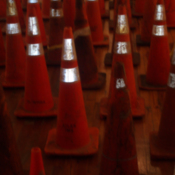Danny Ramirez
I’m a first generation American born citizen from immigrant Cuban parents. I’m also one of six siblings including a twin brother who is only five minutes older than me. My parents were teenage sweethearts in Cuba, but were both forced to follow their parents into new unexplored territories in America. They left Cuba during the beginning of Fidel Castro’s regime. As countless other immigrants have done in the past, my father first entered the United States through that historical harbor guarded by the Statue of Liberty; he became a New Yorker. My mother her sister, and their windowed mother came to Miami, but then went on to various states, including Chicago. Both of my parents went on to marry other people and begin new lives. My mother had one daughter from her first marriage and my father had a daughter and a son from his. Though their first marriages did not work out, they would later find each other again in Miami. Being single parents who were both still very young, it wasn’t long before family matchmakers took matters into their own hands and introduced the couple. You can say there was a fairy tale in exile.
My parents had always been attracted for one another and grew up with similar religious beliefs, so once reunited; they quickly married and began to enlarge their family. Together they had three other children, all boys. Two of those boys were fraternal twins, of which I was one. We grew up in a bilingual home. My mother because of her travels had learned to speak English fluently and became a legal secretary. My father who first began working in LaGuardia Airport would eventually work at the Miami International Airport where he retired after twenty-five years of service.
As for me I was always a very self-aware child growing up. I had a good understanding of, as well as a deep concern for, the adults in my life and their plight.
At a young age I realized that being a child meant not having many responsibilities, whereas being an adult meant lots of worries. So I became concerned about growing up, because I didn’t think that I would ever manage as an adult, I guess a part of me did not want to be a Cuban at a time when Cubans were still the first exiles in South Florida. I also noticed a difference between myself and this new breed of Cuban exiles. I considered myself an American not a Cuban, and I looked at these newcomers as mere refuges. Soon I would realize that these exiles were my roots staring me right in the face. As I matured I learned to identify with that perspective while in turn identifying with my Cuban roots. I acquired much of my knowledge from my Grandmother and her stories. She would give me an occasional glimpse of Cuba as she had once experienced it herself. I remember bringing these stories to life in my own subconscious and feeling as if I was seeing these memories as clear as she did. In many ways these moments spent with my Grandmother became like a form of exercise, broadening my creative senses.
The conflicts I experienced on who I was and where I came from, as well as the fact that I was one of a brood of siblings, made me search for something that was my own. In my early work I began to resolve many of these issues. I still remember my first experience in the arts at the age of five. My teacher gave us an outline of a butterfly on a poster board in order to color by section. I began cutting out the wings and affixing them back onto the body, taking unusual colors and creating designs on pure emotion. My teacher was confused at first, but she supported my creativity. Other children felt comfortable around me through my art. It was then that I learned that through art I could fit in. Always the quiet type and sort of an outcast, it was easy to voice myself through the arts. This was the first time that I felt passionate about anything at all. I wanted to be an artist from that day and beyond.
[Content provided by Danny Ramirez]












